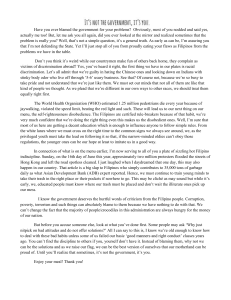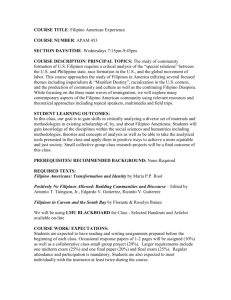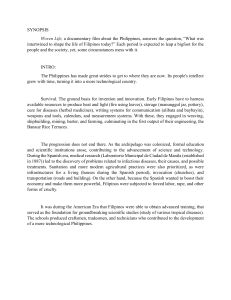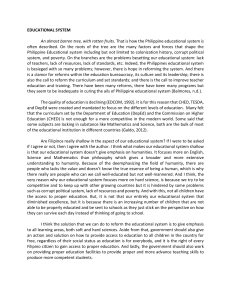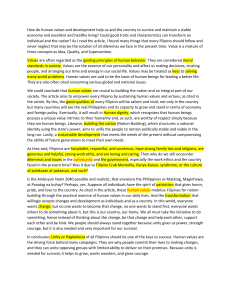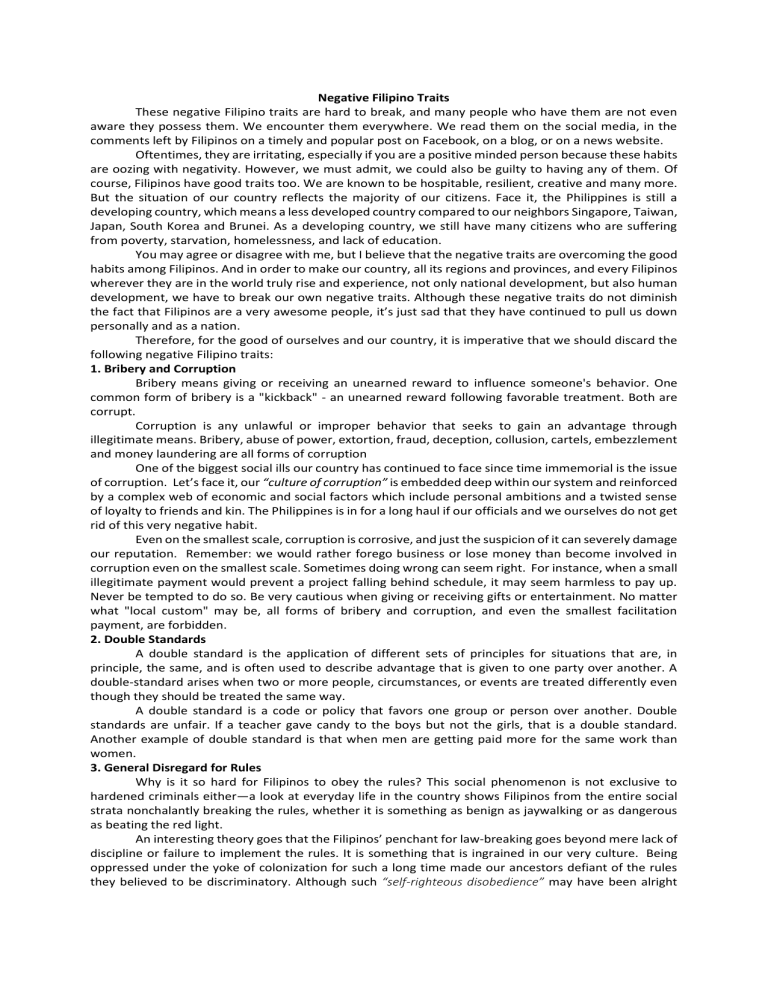
Negative Filipino Traits These negative Filipino traits are hard to break, and many people who have them are not even aware they possess them. We encounter them everywhere. We read them on the social media, in the comments left by Filipinos on a timely and popular post on Facebook, on a blog, or on a news website. Oftentimes, they are irritating, especially if you are a positive minded person because these habits are oozing with negativity. However, we must admit, we could also be guilty to having any of them. Of course, Filipinos have good traits too. We are known to be hospitable, resilient, creative and many more. But the situation of our country reflects the majority of our citizens. Face it, the Philippines is still a developing country, which means a less developed country compared to our neighbors Singapore, Taiwan, Japan, South Korea and Brunei. As a developing country, we still have many citizens who are suffering from poverty, starvation, homelessness, and lack of education. You may agree or disagree with me, but I believe that the negative traits are overcoming the good habits among Filipinos. And in order to make our country, all its regions and provinces, and every Filipinos wherever they are in the world truly rise and experience, not only national development, but also human development, we have to break our own negative traits. Although these negative traits do not diminish the fact that Filipinos are a very awesome people, it’s just sad that they have continued to pull us down personally and as a nation. Therefore, for the good of ourselves and our country, it is imperative that we should discard the following negative Filipino traits: 1. Bribery and Corruption Bribery means giving or receiving an unearned reward to influence someone's behavior. One common form of bribery is a "kickback" - an unearned reward following favorable treatment. Both are corrupt. Corruption is any unlawful or improper behavior that seeks to gain an advantage through illegitimate means. Bribery, abuse of power, extortion, fraud, deception, collusion, cartels, embezzlement and money laundering are all forms of corruption One of the biggest social ills our country has continued to face since time immemorial is the issue of corruption. Let’s face it, our “culture of corruption” is embedded deep within our system and reinforced by a complex web of economic and social factors which include personal ambitions and a twisted sense of loyalty to friends and kin. The Philippines is in for a long haul if our officials and we ourselves do not get rid of this very negative habit. Even on the smallest scale, corruption is corrosive, and just the suspicion of it can severely damage our reputation. Remember: we would rather forego business or lose money than become involved in corruption even on the smallest scale. Sometimes doing wrong can seem right. For instance, when a small illegitimate payment would prevent a project falling behind schedule, it may seem harmless to pay up. Never be tempted to do so. Be very cautious when giving or receiving gifts or entertainment. No matter what "local custom" may be, all forms of bribery and corruption, and even the smallest facilitation payment, are forbidden. 2. Double Standards A double standard is the application of different sets of principles for situations that are, in principle, the same, and is often used to describe advantage that is given to one party over another. A double-standard arises when two or more people, circumstances, or events are treated differently even though they should be treated the same way. A double standard is a code or policy that favors one group or person over another. Double standards are unfair. If a teacher gave candy to the boys but not the girls, that is a double standard. Another example of double standard is that when men are getting paid more for the same work than women. 3. General Disregard for Rules Why is it so hard for Filipinos to obey the rules? This social phenomenon is not exclusive to hardened criminals either—a look at everyday life in the country shows Filipinos from the entire social strata nonchalantly breaking the rules, whether it is something as benign as jaywalking or as dangerous as beating the red light. An interesting theory goes that the Filipinos’ penchant for law-breaking goes beyond mere lack of discipline or failure to implement the rules. It is something that is ingrained in our very culture. Being oppressed under the yoke of colonization for such a long time made our ancestors defiant of the rules they believed to be discriminatory. Although such “self-righteous disobedience” may have been alright during their time, the behavior would continue to manifest itself among the later Filipinos, resulting in an utter lack of respect for the rules. 4. Pagtatakpan This attitude, pagtatakpan, refers to the covering-up of the shortcomings or wrongdoings of another person. This may involve the whole group justifying the wrongdoings, or at least proving excuses for them, of a group’s errant members, if only to preserve group integrity. Pagtatakpan is somehow related to “Pakikisama,” which is not ethically wrong in itself. While “pakikisama” is viewed as group cooperation or solidarity in a positive sense, pagtatakpan is pakikisama to a fault or solidarity to the extreme. Pagtatakpan has no place in the workplace. It has never been right to cover-up the wrongdoings of your co-worker i.e., stealing money from the company. 5. Gossiping Many Filipinos are fond of talking about the others’ business. It is not just the women, but the men too, are into gossiping. Even men can also be nosy on other people’s lives. Gossiping is unethical in business and in the workplace. It inflicts others and destroys the reputation and relationships of those who are involved-whether professional or personal relationships. A worthy employee may quit an organization due to workplace gossip induced stress. This in turn will lead to the company gaining a bad reputation outside the walls of the company. Gossip is such a powerful tool that if you are the subject of gossip or if you are being subjected to gossip, you may feel ostracized in such a way as only gossip can make you feel. Gossip may even lead to serious psychological problems such as anxiety, depression, and an increased suicidal tendency. If someone gossips about someone to you, simply hear them out, but refrain from making any comments. If that person specifically asks you for an opinion, respond with “Oh I don’t know, I haven’t much interacted with him/her.” As to staying out of workplace gossip, the best policy is to remember why the company hired you. They saw in you something that they did not see in the rest of the interviewees. Respect that, appreciate that, and live up to it every single day. 6. NIngas-Cogon Filipinos are fond of starting a project with so much enthusiasm. This enthusiasm is so contagious that it spreads like wildfire. At the first sign of problem or difficulty, this enthusiasm is consumed as fast as it has spread. As a Filipino cultural trait, it refers to enthusiastically starting things, but then quickly losing enthusiasm soon after. So if you try to lit up a cogon you would observe how it will just burn into flames and poof! gone afterwards! The term “ningas-cogon” is actually derived from the word cogon, which refers to cogon grass, a tall, green, thin type of grass that grows through large fields and easily catches fire. Because cogon grass is thin in texture, any amount of flame brought close to it can cause a quick and wild fire. The next thing you know, you are left with an empty field of dead and burned grass. The reason people use the term ningas-cogon is because it refers to the fact that people show fervent interest in a new topic (like the wild fire), but also lose interest just as quickly (like the cogon grass that burns out rapidly). Oftentimes, people describe ningas-cogon as procrastination, as it refers to the fact that people tend to show immense interest in new topics, and then procrastinate by failing to follow through with the necessary means of solving the incident at hand. Correlating ningas -cogon to the Filipinos could be rooted from the fact that in more ways than one, Filipinos tend to leave problems unsolved or projects undone because of lack of knowledge on how to resolve or fix the problems thus, it is “better” to leave it, but, the truth is, it is more of the lack of understanding of the root of the problems.
